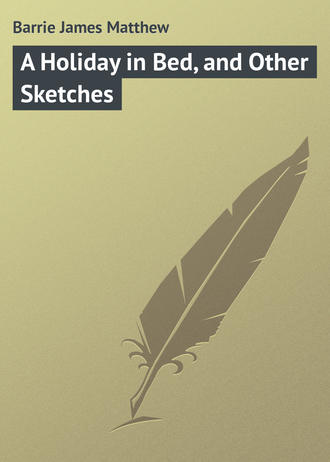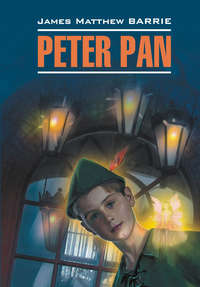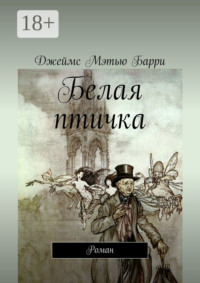
A Holiday in Bed, and Other Sketches
"Ah, Janet," the guest may say (for he enjoys her interference more than I do), "you make him so comfortable that you spoil him."
"Maybe," says Janet, "but it took me years to learn how to manage him."
"Does he need to be managed?"
"I never knew a man that didna."
Then they get Janet to tell them all my little "tantrums" (as she calls them), and she holds forth on my habit of mislaying my hat and then blaming her, or on how I hate rice pudding, or on the way I have worn the carpet by walking up and down the floor when I would be more comfortable in a chair. Now and again I have wound myself up to the point of reproving Janet when the guest had gone, but the result is that she tells her select friends how "quick in the temper" I am. So Janet must remain as she has grown and it is gratifying to me (though don't let on) to know that she turns up her nose at every other minister who preaches in my church. Janet is always afraid when I go off for a holiday that the congregations in the big towns will "snap me up." It is pleasant to feel that she has this opinion of me, though I know that the large congregations do not share it.
Who are my winter visitors? The chief of them is the doctor. We have no doctor, of course, up here, and this one has to come twelve miles to us. He is rather melancholy when we send for him; but he wastes no time in coming, though he may not have had his clothes off for twenty-four hours, and is well aware that we cannot pay big fees. Several times he has had to remain with me all night, and once he was snowed up here for a week. At times, too, he drives so far on his way to us and then has to turn back because the gig sticks on the heavy roads. He is only a doctor in a small country town, but I am elated when I see him, for he can tell me whether the Government is still in power. Then I have the school inspector once a year. The school inspector is always threatening to change the date of inspection to summer, but he takes the town from which the doctor comes in early spring, and finds it convenient to come from there to here. Early spring is often winter with us, so that the school inspector comes when there is usually snow on the ground or threatening. The school is a mile away at another "clachan," but the inspector dines with me, and so does the schoolmaster. On these occasions the schoolmaster is not such good company as at other times, for he is anxious about his passes, and explains (as I think) more than is necessary that regular attendance is out of the question in a place like this. The inspector's visit is the time of my great annual political debate, for the doctor calls politics "fudge." The inspector and I are on different sides, however, and we go at each other hammer and tongs, while the schoolmaster signs to me with his foot not to anger the inspector.
Of course, outsiders will look incredulous when I assure them that a good deal of time is passed in preparing my sermons. I have only one Sabbath service, but two sermons, the one beginning as soon as the other is finished. In such a little church, you will say they must be easily pleased; but they are not. Some of them tramp long distances to church in weather that would keep you, reader, in the house, though your church is round the corner and there is pavement all the way to it. I can preach old sermons? Indeed I cannot. Many of my hearers adjourn to one of the five houses when the service is over, and there I am picked pretty clean. They would detect an old sermon at once, and resent it. I do not "talk" to them from the pulpit. I write my sermons in the manse, and though I use "paper," the less I use it the better they are pleased.
The visits of the doctor are pleasant to me in one sense, but painful in others, for I need not say that when he is called I am required too. To wade through miles of snow is no great hardship to those who are accustomed to it; but the heavy heart comes when one of my people is seriously ill. Up here we have few slight illnesses. The doctor cannot be summoned to attend them, and we usually "fight away" until the malady has a heavy hold. Then the doctor comes, and though we are so scattered, his judgment is soon known all through the glens. When the tourists come back in summer they will not see all the "natives" of the year before.
It is said by those who know nothing of our lives that we have no social events worth speaking of, and no amusements. This is what ignorance brings outsiders to. I had a marriage last week that was probably more exciting than many of your grand affairs in London. And as for amusements, you should see us gathered together in the smiddy, and sometimes in the school-house. But I must break off here for the reason that I have used up all my spare sermon paper – a serious matter. I shall send the editor something about our social gatherings presently, for he says he wants it. Janet, I may add, has discovered that this is not a sermon and is very curious about it.
LIFE IN A COUNTRY MANSE
A WEDDING IN A SMIDDY
I promised to take the world at large into my confidence on the subject of our wedding at the smiddy. You in London, no doubt, dress more gorgeously for marriages than we do – though we can present a fine show of color – and you do not make your own wedding-cake, as Lizzie did. But what is your excitement to ours? I suppose you have many scores of marriages for our one, but you only know of those from the newspapers. "At so-and-so, by the Rev. Mr. Such-a-one, John to Elizabeth, eldest daughter of Thomas." That is all you know of the couple who were married round the corner, and therefore, I say, a hundred such weddings are less eventful in your community than one wedding in ours.
Lizzie is off to Southampton with her husband. As the carriage drove off behind two horses that could with difficulty pull it through the snow, Janet suddenly appeared at my elbow and remarked:
"Well, well, she has him now, and may she have her joy of him."
"Ah, Janet," I said, "you see you were wrong. You said he would never come for her."
"No, no," answered Janet. "I just said Lizzie made too sure about him, seeing as he was at the other side of the world. These sailors are scarce to be trusted."
"But you see this one has turned up a trump."
"That remains to be seen. Anybody that's single can marry a woman, but it's no so easy to keep her comfortable."
I suppose Janet is really glad that the sailor did turn up and claim Lizzie, but she is annoyed in a way too. The fact is that Janet was skeptical about the sailor. I never saw Janet reading anything but the Free Church Monthly, yet she must have obtained her wide knowledge of sailors from books. She considers them very bad characters, but is too shrewd to give her reasons.
"We all ken what sailors are," is her dark way of denouncing those who go down to the sea in ships, and then she shakes her head and purses up her mouth as if she could tell things about sailors that would make our hair rise.
I think it was in Glasgow that Lizzie met the sailor – three years ago. She had gone there to be a servant, but the size of the place (according to her father) frightened her, and in a few months she was back at the clachan. We were all quite excited to see her again in the church, and the general impression was that Glasgow had "made her a deal more lady-like." In Janet's opinion she was just a little too lady-like to be natural.
In a week's time there was a wild rumor through the glen that Lizzie was to be married.
"Not she," said Janet, uneasily.
Soon, however, Janet had to admit that there was truth in the story, for "the way Lizzie wandered up the road looking for the post showed she had a man on her mind."
Lizzie, I think, wanted to keep her wonderful secret to herself, but that could not be done.
"I canna sleep at nights for wondering who Lizzie is to get," Janet admitted to me. So in order to preserve her health Janet studied the affair, reflected on the kind of people Lizzie was likely to meet in Glasgow, asked Lizzie to the manse to tea (with no result), and then asked Lizzie's mother (victory). Lizzie was to be married to a sailor.
"I'm cheated," said Janet, "if she ever sets eyes on him again. Oh, we all ken what sailors are."
You must not think Janet too spiteful. Marriages were always too much for her, but after the wedding is over she becomes good-natured again. She is a strange mixture, and, I rather think, very romantic, despite her cynical talk.
Well, I confess now, that for a time I was somewhat afraid of Lizzie's sailor myself. His letters became few in number, and often I saw Lizzie with red eyes after the post had passed. She had too much work to do to allow her to mope, but she became unhappy and showed a want of spirit that alarmed her father, who liked to shout at his relatives and have them shout back at him.
"I wish she had never set eyes on that sailor," he said to me one day when Lizzie was troubling him.
"She could have had William Simpson," her mother said to Janet.
"I question that," said Janet, in repeating the remark to me.
But though all the clachan shook its head at the sailor, and repeated Janet's aphorism about sailors as a class, Lizzie refused to believe her lover untrue.
"The only way to get her to flare up at me," her father said, "is to say a word against her lad. She will not stand that."
And, after all, we were wrong and Lizzie was right. In the beginning of the winter Janet walked into my study and parlor (she never knocks) and said:
"He's come!"
"Who?" I asked.
"The sailor. Lizzie's sailor. It's a perfect disgrace."
"Hoots, Janet, it's the very reverse. I'm delighted; and so, I suppose, are you in your heart."
"I'm not grudging her the man if she wants him," said Janet, flinging up her head, "but the disgrace is in the public way he marched past me with his arm round her. It affronted me."
Janet gave me the details. She had been to a farm for the milk and passed Lizzie, who had wandered out to meet the post as usual.
"I've no letter for ye, Lizzie," the post said, and Lizzie sighed.
"No, my lass," the post continued, "but I've something better."
Lizzie was wondering what it could be, when a man jumped out from behind a hedge, at the sight of whom Lizzie screamed with joy. It was her sailor.
"I would never have let on I was so fond of him," said Janet.
"But did he not seem fond of her?" I asked.
"That was the disgrace," said Janet. "He marched off to her father's house with his arm around her; yes, passed me and a wheen other folk, and looked as if he neither kent nor cared how public he was making himself. She did not care either."
I addressed some remarks to Janet on the subject of meddling with other people's affairs, pointing out that she was now half an hour late with my tea; but I, too, was interested to see the sailor. I shall never forget what a change had come over Lizzie when I saw her next. The life was back in her face, she bustled about the house as busy as a bee, and her walk was springy.
"This is him," she said to me, and then the sailor came forward and grinned. He was usually grinning when I saw him, but he had an honest, open face, if a very youthful one.
The sailor stayed on at the clachan till the marriage, and continued to scandalize Janet by strutting "past the very manse gate" with his arm round the happy Lizzie.
"He has no notion of the solemnity of marriage," Janet informed me, "or he would look less jolly. I would not like a man that joked about his marriage."
The sailor undoubtedly did joke. He seemed to look on the coming event as the most comical affair in the world's history, and when he spoke of it he slapped his knees and roared. But there was daily fresh evidence that he was devoted to Lizzie.
The wedding took place in the smiddy, because it is a big place, and all the glen was invited. Lizzie would have had the company comparatively select, but the sailor asked every one to come whom he fell in with, and he had few refusals. He was wonderfully "flush" of money, too, and had not Lizzie taken control of it, would have given it all away before the marriage took place.
"It's a mercy Lizzie kens the worth of a bawbee," her mother said, "for he would scatter his siller among the very bairns as if it was corn and he was feeding hens."
All the chairs in the five houses were not sufficient to seat the guests, but the smith is a handy man, and he made forms by crossing planks on tubs. The smiddy was an amazing sight, lit up with two big lamps, and the bride, let me inform those who tend to scoff, was dressed in white. As for the sailor, we have perhaps never had so showily dressed a gentleman in our parts. For this occasion he discarded his seafaring "rig out" (as he called it), and appeared resplendent in a black frock coat (tight at the neck), a light blue waistcoat (richly ornamented), and gray trousers with a green stripe. His boots were new and so genteel that as the evening wore on he had to kick them off and dance in his stocking soles.
Janet tells me that Lizzie had gone through the ceremony in private with her sailor a number of times, so that he might make no mistake. The smith, asked to take my place at these rehearsals, declined on the ground that he forgot how the knot was tied: but his wife had a better memory, and I understand that she even mimicked me – for which I must take her to task one of these days.
However, despite all these precautions, the sailor was a little demonstrative during the ceremony, and slipped his arm around the bride "to steady her." Janet wonders that Lizzie did not fling his arm from her, but Lizzie was too nervous now to know what her swain was about.
Then came the supper and the songs and the speeches. The tourists who picture us shivering, silent and depressed all through the winter should have been in the smiddy that night.
I proposed the health of the young couple, and when I called Lizzie by her new name, "Mrs. Fairweather," the sailor flung back his head and roared with glee till he choked, and Lizzie's first duty as a wife was to hit him hard between the shoulder blades. When he was sufficiently composed to reply, he rose to his feet and grinned round the room.
"Mrs. Fairweather," he cried in an ecstacy of delight, and again choked.
The smith induced him to make another attempt, and this time he got as far as "Ladies and gentlemen, me and my wife – " when the speech ended prematurely in resounding chuckles. The last we saw of him, when the carriage drove away, he was still grinning; but that, as he explained, was because "he had got Lizzie at last." "You'll be a good husband to her, I hope," I said.
"Will I not," he cried, and his arm went round his wife again.
A POWERFUL DRUG
(NO HOUSEHOLD SHOULD BE WITHOUT IT.)
All respectable chemists, Montgomery assures me, keep the cio-root. That is the name of the drug, and Montgomery is the man who ought to write its testimonials. This is a testimonial to the efficacy of the cio-root, and I write it the more willingly, because, until the case of Montgomery cropped up, I had no faith in patent medicines. Seeing, however, is, they say, believing; and I have seen what the cio-root did for Montgomery. I can well believe now that it can do anything, from removing grease-spots to making your child cry out in the night.
Montgomery, who was married years ago, is subject to headaches, and formerly his only way of treating them was to lie in bed and read a light novel. By the time the novel was finished, so, as a rule, was the headache. This treatment rather interfered with his work, however, and he tried various medicines which were guaranteed to cure rapidly. None of them had the least result, until one day, some two months ago, good fortune made him run against an old friend in Chambers street. Montgomery having a headache, mentioned it, and his friend asked him if he had tried the cio-root. The name even was unfamiliar to Montgomery, but his friend spoke so enthusiastically of it that the headachy man took a note of it. He was told that it had never been known to fail, and the particular merit of it was that it drove the headache away in five minutes. The proper dose to take was half an inch of the root, which was to be sucked and eventually swallowed. Montgomery tried several chemists in vain, for they had not heard of it, but at last he got it on George IV. Bridge. He had so often carried home in triumph a "certain cure," which was subsequently flung out at the window in disgust, that his wife shook her head at the cio-root, and advised him not to be too hopeful. However, the cio-root surpassed the fondest expectations. It completely cured Montgomery in less than the five minutes. Several times he tried it, and always with the same triumphant result. Having at last got a drug to make an idol of, it is not perhaps to be wondered at that Montgomery was full of gratitude. He kept a three pound tin of the cio-root on his library-table, and the moment he felt a headache coming on he said, "Excuse me for one moment," and bit off half an inch of cio-root.
The headaches never had a chance. It was, therefore, natural, though none the less annoying, that his one topic of conversation should become the properties of this remarkable drug. You would drop in on him, glowing over the prospect of a delightful two hours' wrangle over the crofter question, but he pushed the subject away with a wave of his hand, and begged to introduce to our notice the cio-root. Sitting there smoking, his somewhat dull countenance would suddenly light up as his eyes came to rest on the three-pound tin. He was always advising us to try the cio-root, and when we said we did not have a headache he got sulky. The first thing he asked us when we met was whether we had a headache, and often he clipped off an inch or two of the cio-root and gave it us in a piece of paper, so that a headache might not take us unawares. I believe he rather enjoyed waking with a headache, for he knew that it would not have a chance. If his wife had been a jealous woman, she would not have liked the way he talked of the cio-root.
Some of us did try the drug, either to please him or because we were really curious about it. Whatever the reason, none of us, I think, were prejudiced. We tested it on its merits, and came unanimously to the conclusion that they were negative. The cio-root did us no harm. The taste was what one may imagine to be the taste of the root of any rotten tree dipped in tar, which was subsequently allowed to dry. As we were all of one mind on the subject, we insisted with Montgomery that the cio-root was a fraud. Frequently we had such altercations with him on the subject that we parted in sneers, and ultimately we said that it would be best not to goad him too far; so we arranged merely to chaff him about his faith in the root, and never went farther than insisting, in a pleasant way, that he was cured, not by the cio-root, but by his believing in it. Montgomery rejected this theory with indignation, but we stuck to it and never doubted it. Events, nevertheless, will show you that Montgomery was right and that we were wrong.
The triumph of cio-root came as recently as yesterday. Montgomery, his wife, and myself, had arranged to go into Glasgow for the day. I called for them in the forenoon and had to wait, as Montgomery had gone along to the office to see if there were any letters. He arrived soon after me, saying that he had a headache, but saying it in a cheery way, for he knew that the root was in the next room. He disappeared into the library to nibble half an inch of the cio-root, and shortly afterwards we set off. The headache had been dispelled as usual. In the train he and I had another argument about the one great drug, and he ridiculed my notion about its being faith that drove his headache away. I may hurry over the next two hours, up to the time when we wandered into Buchanan street. There Montgomery met a friend, to whom he introduced me. The gentleman was in a hurry, so we only spoke for a moment, but after he had left us he turned back.
"Montgomery," he said, "do you remember that day I met you in Chambers street, Edinburgh?"
"I have good reason for remembering the occasion," said Montgomery, meaning to begin the story of his wonderful cure; but his friend who had to catch a 'bus, cut him short.
"I told you at that time," he said, "about a new drug called the cio-root, which had a great reputation for curing headaches."
"Yes," said Montgomery; "I always wanted to thank you – "
His friend, however, broke in again —
"I have been troubled in my mind since then," he said, "because I was told afterwards that I had made a mistake about the proper dose. If you try the cio-root, don't take half an inch, as I recommended, but quarter of an inch. Don't forget. It is of vital importance."
Then he jumped into his 'bus, but I called after him, "What would be the effect of half an inch?"
"Certain death!" he shouted back, and was gone. I turned to look at Montgomery and his wife. She let her umbrella fall and he had turned white. "Of course, there is nothing to be alarmed about," I said, in a reassuring way. "Montgomery has taken half an inch scores of times; you say it always cured you."
"Yes, yes," Montgomery answered; but his voice sounded hollow.
Up to this point the snow had kept off, but now it began to fall in a soaking drizzle. If you are superstitious you can take this as an omen. For the rest of the day, certainly, we had a miserable time of it. I had to do all the talking, and while I laughed and jested, I noticed that Mrs. Montgomery was looking anxiously from time to time at her husband. She was afraid to ask him if he felt unwell, and he kept up, not wanting to alarm her. But he walked like a man who knew that he had come to his last page. At my suggestion we went to the Enoch's Station Hotel to have dinner. I had dinner, Mrs. Montgomery pretended to have dinner, but Montgomery himself did not even make the pretense. He sat with his elbows on the table and his face buried in his hands. At last he said with a groan that he was feeling very ill. He looked so doleful that his wife began to cry.
Montgomery admitted that he blamed the cio-root for his sufferings. He had taken an overdose of it, he said, tragically, and must abide the consequences. I could have shaken him, for reasoning was quite flung away on him. Of course, I repeated what I had said previously about an overdose having done him no harm before, but he only shook his head sadly. I said that his behavior now proved my contention that he only believed in the cio-root because he was told that it had wonderful properties; otherwise he would have laughed at what his friend had just told him. Undoubtedly, I said, his sufferings to-day were purely imaginary. Montgomery did not have sufficient spirits to argue with me, but he murmured in a die-away voice that he had felt strange symptoms ever since we set out from Edinburgh. Now, this was as absurd as anything in Euclid, for he had been boasting of the wonderful cure the drug had effected again most of the way between Edinburgh and Glasgow. He insisted that he had a splitting headache, and that he was very sick. In the end, as his wife was now in a frenzy, I sent out for a doctor. The doctor came, said "yes" and "quite so" to himself, and pronounced Montgomery feverish. That he was feverish by this time, I do not question. He had worked himself into a fever. There was some talk of putting him to bed in the hotel, but he insisted on going home. Though he did not put it so plainly, he gave us to understand that he wanted to die in his own bed.
Never was there a more miserable trio than we in a railway carriage. We got a compartment to ourselves, for though several passengers opened the door to come in, they shrank back as soon as they saw Montgomery's ghastly face. He lay in a corner of the carriage, with his head done up in flannel, procured at the hotel. He had the rugs and my great coat over his legs, but he shivered despite them, and when he spoke at all, except to say that he was feeling worse every minute, it was to talk of men cut off in their prime and widows left destitute. At Mrs. Montgomery's wish, I telegraphed from a station at which the train stopped to the family doctor in Edinburgh, asking him to meet us at the house. He did so; indeed, he was on the steps to help Montgomery up them. We took an arm of the invalid apiece, and dragged him into the library.









